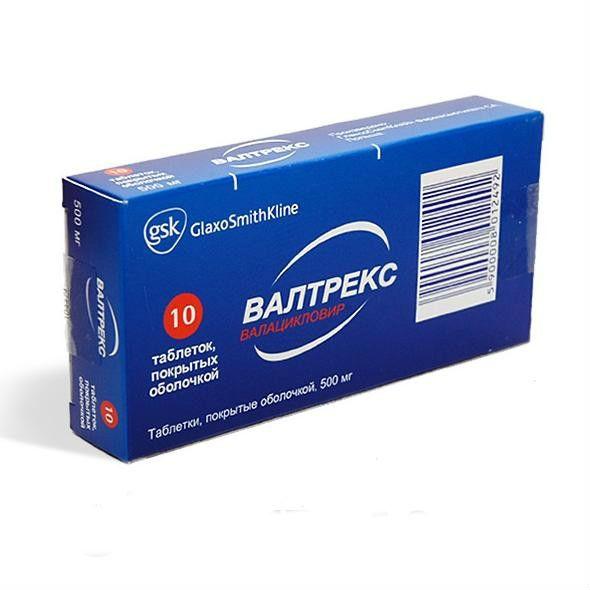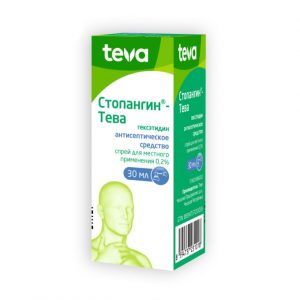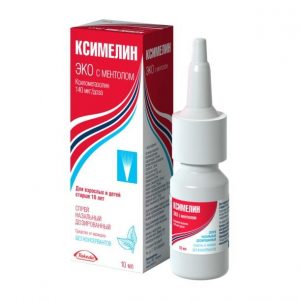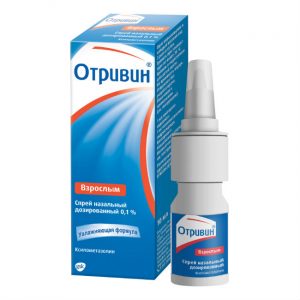Description
Release form
Tablets.
Pharmacological action
Valtrex – antiviral.
After phosphorylation with the formation of active triphosphate, it competitively inhibits viral DNA polymerase, blocks DNA synthesis and viral replication.
Indications
Herpes zoster (including pain in acute and postherpetic neuralgia)
infections of the skin and mucous membranes caused by the herpes simplex virus (including the first detected and recurrent genital herpes)
relapse prevention.
Contraindications
Hypersensitivity (including to acyclovir).
Special instructions
Patients at risk of dehydration, especially elderly patients, should be provided with adequate hydration during treatment with Valtrex.
Patients with renal failure have an increased risk of developing neurological complications.
In case of impaired liver function in patients with mild or moderate hepatic cirrhosis (synthetic liver function is preserved), dose adjustment of Valtrex is not required. In the study of pharmacokinetics in patients with severe cirrhosis of the liver (with impaired synthetic liver function and the presence of shunts between the portal system and the common vascular bed), no data were obtained indicating the need for correction of the dosage regimen, however, the clinical experience with the use of Valtrex in this category of patients is organic.
There is no data on the use of Valtrex in high doses (4 g / day or more) in patients with liver diseases, therefore, it is necessary to prescribe the drug with high doses in this category of patients.
Elderly patients do not require dose adjustment, except in cases of significant impairment of renal function. It is necessary to maintain an adequate water-electrolyte balance.
There have been no special studies to investigate the effects of Valtrex in patients with liver transplantation. However, it has been shown that prophylactic administration of acyclovir in high doses reduces cytomegalovirus infection.
Suppressive therapy with Valtrex reduces the risk of transmission of genital herpes, but does not completely exclude it and does not lead to a complete cure. During Valtrex therapy, the patient should take measures to ensure the safety of the partner during sexual intercourse.
Pediatric use
There is no clinical experience with the drug in children.
Influence on the ability to drive vehicles and work with mechanisms
No special precautions are required.
Composition
Valaciclovir (L-valine ester of acyclovir) 500 mg.
Dosage and Administration
Inside. Adults with herpes zoster – 1000 mg 3 times a day (7 days).
With herpes simplex – 500 mg 2 times a day for relapses – for 5 days.
During the first episode with a severe course, the duration of treatment can be increased to 10 days.
Side effects
Adverse reactions are listed below according to the classification according to major systems and organs and frequency of occurrence: very often (? 1/10), often (? 1/100, CNS: often – headache.
Co digestive system side: often nausea
Data from post-marketing research
Immune system: very rare anaphylaxis
CNS side: rare – dizziness, confusion, hallucinations, decreased mental ability very rarely – agitation, tremor, ataxia , dysarthria, psychotic symptoms, convulsions, encephalopathy, coma.
These reactions are reversible and usually observed in patients with impaired renal function or against the background of other predisposing conditions. receiving Valtrex in high doses (8 g / day) for the prevention of cytomegalovirus infection, neurological reactions develop more often than when taken in lower doses.
From the respiratory system: infrequently – dyspnea.
From the digestive system: rarely – a feeling of discomfort in the abdomen, vomiting, diarrhea is very rare – reversible violations of the functional tests of the liver (which are sometimes regarded as manifestations of hepatitis).
From the hemopoietic system: very rarely – leukopenia (mainly observed in patients with reduced immunity), thrombocytopenia.
Dermatological reactions: infrequently – rash, photosensitivity manifestations rarely – itching.
Allergic reactions: very rarely – urticaria, angioedema.
From the urinary system: rarely – impaired renal function very rarely – acute renal failure, renal colic (may be associated with impaired renal function).
Other: in patients with severely impaired immunity, especially those with advanced AIDS, receiving valaciclovir in high doses (8 g / day daily) for a long time, there have been cases of renal failure, microangiopathic hemolytic anemia and thrombocytopenia (sometimes in combination). Similar adverse reactions were noted in patients with the same diseases, but not receiving valaciclovir.
Drug Interactions
Clinically significant interaction of the drug Valtrex with other drugs has not been established.
Acyclovir is excreted in the urine mainly unchanged as a result of active tubular secretion. After taking Valtrex in a dose of 1 g, cimetidine and probenecid, which block tubular secretion, increase the AUC of acyclovir and reduce its renal clearance. However, dose adjustment of Valtrex is not required, as Acyclovir has a broad therapeutic index.
Caution is advised to use Valtrex at higher doses (4 g / day) concurrently with drugs that compete with acyclovir for the elimination route, as there is a risk of an increase in plasma levels of one or both drugs or their metabolites. An increase in the AUC of acyclovir and an inactive metabolite of mycophenolate mofetil (an immunosuppressant used in transplantation) was noted with the simultaneous use of these drugs.
Caution must be exercised when combining Valtrex in a high dose (4 g / day or more) with drugs that impair renal function (including cyclosporin, tacrolimus).
Overdose
There are currently not enough data on overdose of Valtrex.
Symptoms: with a single oral administration of acyclovir in an excessive dose of up to 20 g, partial absorption from the gastrointestinal tract occurred, which was not accompanied by the toxic effect of the drug. Ingestion of excessive doses of acyclovir for several days was accompanied by gastrointestinal (nausea, vomiting) and neurological symptoms (headache, confusion). Intravenous administration of acyclovir in excessive doses was accompanied by an increase in serum creatinine and the subsequent development of renal failure, while neurological complications included confusion, hallucinations, agitation, convulsions and coma.
Treatment: Patients should be closely monitored for signs of toxicity. Hemodialysis significantly enhances the removal of acyclovir from the blood and can be considered the treatment of choice for patients with an overdose of Valtrex.
Storage conditions
At temperatures not exceeding 30 ° C
The Expiration of
is 3 years.
active substance
Valaciclovir
drugstore conditions paf2pf000 drugstore vacations from pharmacies
By prescription
lekarstvennaja form
tablets
Indications
Genital herpes, Shingles, Herpes
Possible product names
VALTREKS 0.5 N10 TABLES
VALTREKS 0.5 N10 TABLES P / O
Valtreks 500mg Tab. p / pl / rev X10
Valtrex 500mg No. 10
Valtrex 500mg No. 10 tab
GlaxoSmithKline, UK




